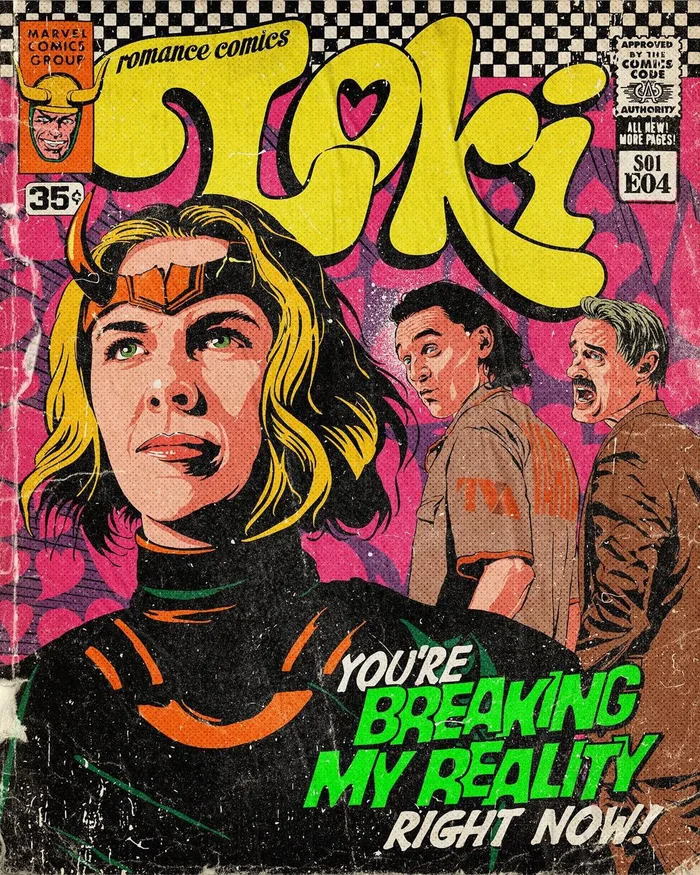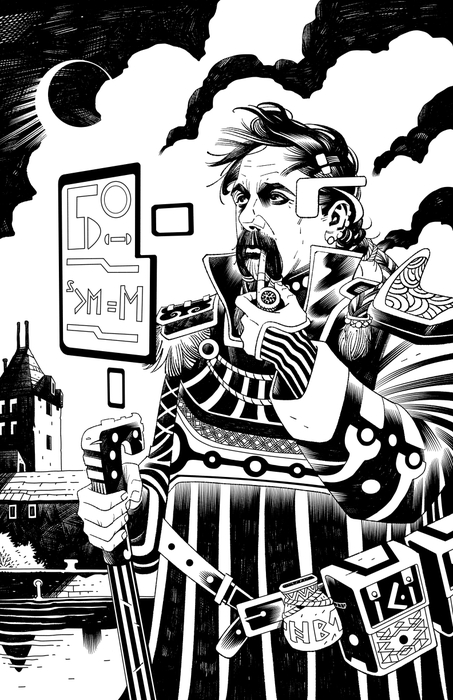Loki's Season 1: a question of will versus wyrd.
Given that the largest NorsePlay on the pop cultural block is Marvel's The Mighty Thor, it goes hand-in-hand that his rival for the throne of Asgard, Loki, has gained a near-equal amount of attention, and with Tom Hiddleston's charming performance upping the character's fanbase to an unprecedented level, it makes sense to fan service that army of horny-headed followers with a Disney+ series.
Yet smart commercialism aside to gain MCU moviegoers streaming subscriptions for an exclusive Marvel-based show, Loki really manages to deliver a self-exploring complex character in an expansive MCU pocket-world, with all the sci-fi time-travel dynamics that'll bend your head like a mobius strip with their consequences.
[Okay, spoilers from here on as this is a post-viewing commentary.]
As with any time-travel story, self-determination versus set fate is often an invisible force the protagonist is up against. Unfortunately there's a whole outside-of-time bureaucracy, the Time Variance Authority (TVA), who stop people from doing anything major within the approved timeline that would cause a different timeline to branch off. They portal there, time patrol arrest the variant person, erase that alternative timeline, and bring them to their HQ for a quick trial and "pruning", meaning deletion from their accepted timeline via execution.
This same theme is tackled in the Journey Into Mystery comics' amazing Kid Loki story arc where Loki manages to die to escape his destiny of just being the God Of Mischief doomed to always ultimately lose and uses a loophole to come back as a child free of those preset boundaries of fate.
Loki believes he controls his own fate, that being a fulfillment of his own chosen "glorious purpose", though what that specifically is, or if it will fulfill or make him happy is a larger question, that latter explored in Thor & Loki: Blood Brothers (motion comic, 2011 CE) where Loki wins, becoming King of Asgard, but is only even more deeply troubled than ever.
And in the TVA trying to use Loki, Loki's awareness of things in turn increases, finding out he's destined to only get choked to death by Thanos should he return to the official timeline, and the gods'-eye-view abilities of the TVA make them a target for his ever-shifting ambitions.
The show flits through six episodes with ever escalating stakes, reveals, conflicts, and higher odds, all while Loki meets differing versions of himself that make him seriously question his own ego, potential, and purpose.
So I could review this show like everyone else, but hey, you read NorsePlay for potential expansions and Norse Lore relevant aspects that we all could learn from, so let's start with a few things I thought were aesthetically/narratively worthy, then comment on how this show incidentally ellipses the Norse Lore & Cosmology itself:
• The coolest expansion is Boastful Loki's hammer:
| [3D model of Boastful Loki's Mjolnir made by user LITTLE_STORIES.] |
The questions this differing artifact raises alone are provocative. Boastful Loki brags that he defeats the Avengers (presumably killing Thor) and scores the Infinity Stones before the TVA shows up to remove him. This probably places his victory after Hela crushes Mjölnir, and his acquisition ahead of Thanos, so he reconstructs or commissions his own version of Mjölnir from a wrench handle, golden Asgardian monorail rails, and bolted plate metal bindings. Again, the possibility of multiple hammers presents itself, or what-if variants of said hammer.
• Hiddleston sings an original Asgardian song, Jeg Saler Min Ganger (that's actually Norwegian for I Saddle My Steed) in a lounge train car audience winning performance:
Showing Loki in a sort-of party monster, good-time guy mode, socially owning the room, perhaps semi-addresses the question as to why ever in the Norse Lore do the Æsir keep such a huge troublemaking jerkface within their highest of circles?
• Owen Wilson puts in a great supporting role as TVA Agent Mobius M. Mobius. |
| [Mobius at right, with Loki & Sophie on faux cover by the famed pop artist butcherbilly.] |
The down-home, everyman, plain-speaking time detective serves as a foil for silver-tongued Loki, and Wilson & Hiddleston ramp up each other's performances in a delightful way as they time-travel together. One could see Mobius' tonality being more of the Norse Lore's straight-shooting Thor as Loki's companion as they adventure forth into Jotunheimr together (... well, at least until Thor gets angry and all Hel breaks loose).
• Finding He Who Remains' purpose as a lesser-evil secret time-dictator who keeps the chronoverse in check from ripping itself apart is a mind-blowing reveal. If we look at the function of the Norns in the Norse Lore, we've a relatively unsympathetic trio of jotunesses who weave the skein of all individuals' fates into a larger cohesive picture, but also take time to clay-patch & heal Yggdrasil from the constant damage it suffers from the animals that gnaw and travel it, thus keeping the central pillar that the multiverse hangs on intact.
And finally, to get back to the blog's title of will versus wyrd: If we look at the actual Norse Lore, this is Odin's struggle and long game versus what seems to be an inevitable universal destroying battle, Ragnarök, as foretold to him in the Völuspá by the seeress he necromances out of the ground for answers. Despite knowing this, Odin plans against it. And in Lokasenna (Loki's Flyting), Loki is foretold of his binding. Yet Loki doesn't shut up and then submit to capture, but just keeps on insulting the Gods until Thor shows up and he begins his run to eventually hide in a house with a door in each wall designed to allow him to see anyone approaching to try and avoid that capture. These actions by the wisest and trickiest of cosmic beings imply they know that perhaps predestination has a margin to be out-thought or out-smarted or out-maneuvered, or they wouldn't bother in making such large scale efforts in the first place. Maybe they know fate will likely win, but in trying, in deeding, there's a nobility that pushes against the fates themselves, and maybe if pushed at the right enough angle, their will can gain some ground, or at least the story of their near-impossible struggle will inspire those who hear it for all time.


Comments
Post a Comment